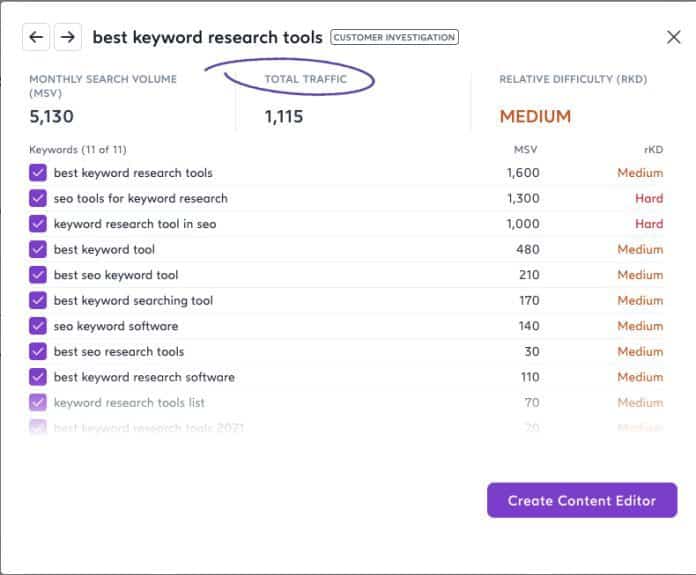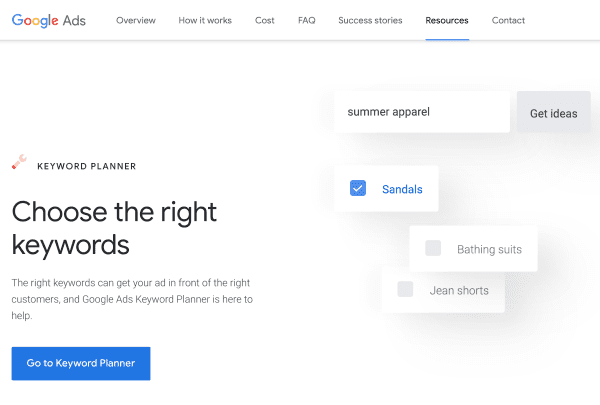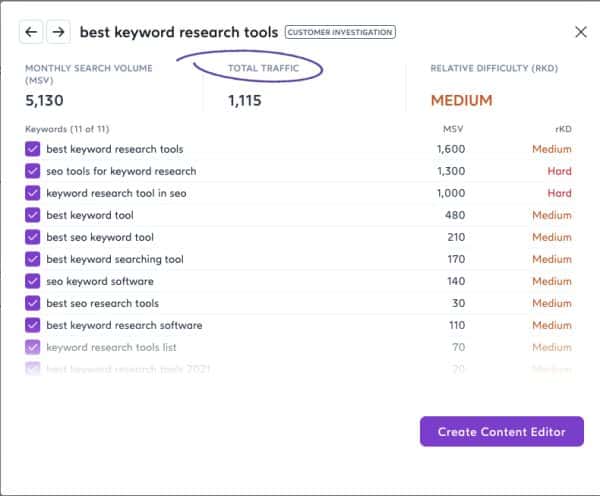Today, we tackle the age-old question that has perplexed website owners and digital marketers alike: how do we choose the right keywords for our websites? In a world where search engine optimization reigns supreme, strategic keyword selection can make the difference between being lost in the abyss of search results or soaring above the competition. But fear not, for we are here to guide you through the maze of keyword research, helping you unlock the secrets to driving targeted organic traffic and boosting your website’s visibility. So, grab a cup of coffee, settle into your favorite chair, and let’s embark on this keyword adventure together.
This image is property of exposureninja.com.
Understanding the Importance of Keywords
Keywords play a crucial role in the success of a website. They are the words and phrases that users input into search engines when looking for information, products, or services. By strategically incorporating relevant keywords into your website’s content, you can improve its visibility and attract more organic traffic.
Review contents
Why are keywords important for your website?
Keywords are important because they act as a bridge between your website and your target audience. When users search for a particular topic or product, search engines like Google analyze the keywords they use and match them with relevant websites. By optimizing your website with relevant keywords, you increase the chances of your website appearing in the search results, driving more organic traffic to your site.
How do keywords affect your website’s visibility?
Keywords are a crucial factor in determining your website’s visibility. When search engines crawl and index websites, they analyze the keywords within the content to understand what the website is about. If your website contains the keywords that users are searching for, search engines are more likely to rank your website higher in the search results, making it more visible to potential visitors.
The role of keywords in search engine optimization
Keywords are an integral part of search engine optimization (SEO). SEO is the practice of optimizing your website to improve its visibility and organic traffic. By conducting thorough keyword research and incorporating the most relevant keywords into your website’s content, meta tags, and headings, you can enhance your website’s SEO. Keywords help search engines understand the purpose and relevance of your website, enabling them to match it with users’ search queries effectively.
Identifying Your Target Audience
Understanding your target audience is crucial for effective keyword research and optimization. By knowing who your audience is, you can better tailor your content to their needs and preferences.
Why is it important to know your target audience?
Knowing your target audience allows you to create content that resonates with them. By understanding their demographics, interests, and pain points, you can craft content that addresses their specific needs and provides value. This targeted approach not only attracts more relevant traffic to your website but also increases the chances of converting visitors into customers or followers.
Defining your target audience
To define your target audience, you need to consider various factors such as age, gender, location, interests, and behavior patterns. Conducting market research and analyzing data can help you narrow down your target audience and create buyer personas. Buyer personas are fictional representations of your ideal customers that include specific details about their characteristics, motivations, and preferences. Creating buyer personas can provide you with valuable insights and guide your content creation and keyword optimization efforts.
Using demographic data to understand your audience
Demographic data plays a significant role in understanding your target audience. It includes information such as age, gender, education level, occupation, and income. Analyzing this data can help you identify patterns and trends within your target audience, allowing you to tailor your content and keyword strategy accordingly. For example, if your target audience consists primarily of young adults, you may want to use more trendy and informal language in your content, while a more mature audience may prefer a more professional and informative tone.
Conducting Keyword Research
Keyword research is a vital step in optimizing your website for search engines. By identifying the right keywords, you can create content that aligns with what your target audience is searching for.
Choosing relevant keywords for your website
When choosing keywords for your website, it’s crucial to consider their relevance to your content and your target audience’s search intent. Start by brainstorming potential keywords that are directly related to your products, services, or industry. Then, use keyword research tools to expand your list and assess the search volume and competition for each keyword. Select keywords that have a good balance of search volume and competition, as targeting highly competitive keywords may be challenging for a new or small website.
Using keyword research tools
Keyword research tools are invaluable resources for finding relevant keywords and analyzing their search volume and competition. There are various free and paid tools available, such as Google Keyword Planner, SEMrush, and Ahrefs. These tools provide insights into keyword search volume, trends, related keywords, and competition, helping you make informed decisions about which keywords to target. By utilizing these tools, you can optimize your website with keywords that have the potential to drive organic traffic.
Evaluating keyword competition
Keyword competition refers to the level of competition among websites targeting the same keywords. It’s essential to assess keyword competition to determine your website’s chances of ranking highly in search results for a particular keyword. High competition keywords may be more challenging to rank for, especially if your website is relatively new or lacks a strong backlink profile. On the other hand, targeting low competition keywords can be a more effective strategy for gaining visibility and driving organic traffic. By evaluating keyword competition, you can choose the right balance of high and low competition keywords to optimize your website effectively.
Long-tail Keywords vs. Short-tail Keywords
When conducting keyword research, you will come across two types of keywords: long-tail and short-tail. Understanding the difference between these two types and when to use them is key to developing an effective keyword strategy.
Understanding the difference between long-tail and short-tail keywords
Long-tail keywords are longer and more specific keyword phrases, usually consisting of three or more words. They tend to have lower search volume but higher conversion rates. Short-tail keywords, on the other hand, are shorter and more general keyword phrases, usually consisting of one or two words. They have higher search volume but may attract less targeted traffic.
When to use long-tail keywords
Long-tail keywords are particularly useful when targeting a specific niche or addressing specific user intent. By using long-tail keywords, you can optimize your website for more specific search queries, attracting highly relevant traffic. For example, if you have a website selling organic gardening supplies, targeting a long-tail keyword like “best organic fertilizer for tomato plants” would attract users specifically interested in organic fertilizers for tomato plants. While the search volume for this keyword may be lower, the chances of converting those visitors into customers are higher.
When to use short-tail keywords
Short-tail keywords are more suitable for generating broader visibility and attracting a larger volume of traffic. These keywords are often more competitive, and it can be challenging to rank highly for them. However, they can be valuable for increasing brand awareness and capturing users who are at the early stages of their search journey. For example, a fashion retailer may want to target the short-tail keyword “women’s clothing,” which has higher search volume but may attract users at various stages of their buying journey.
This image is property of assets-global.website-files.com.
Analyzing Keyword Search Volume
Keyword search volume refers to the number of times a particular keyword is searched for in a given timeframe. Understanding keyword search volume is essential for identifying popular keywords that can drive significant organic traffic to your website.
Why is keyword search volume important?
Keyword search volume provides insight into the popularity and demand for specific keywords. By targeting keywords with higher search volume, you increase the chances of driving more traffic to your website. However, it’s crucial to find a balance between search volume and competition to ensure your website can effectively compete for those keywords.
Tools to analyze keyword search volume
Several tools can help you analyze keyword search volume. Google Keyword Planner, SEMrush, and Ahrefs are popular options that provide data on keyword search volume, trends, and related keywords. These tools offer valuable information that can guide your keyword research and content creation efforts. By using these tools, you can identify high search volume keywords that align with your website’s content and your target audience’s search intent.
Finding a balance between high search volume and competition
While high search volume keywords can attract significant traffic, they often come with high competition. To optimize your website effectively, you need to find a balance between search volume and competition. Targeting keywords with moderate search volume and lower competition can be a more strategic approach for a new or small website. By doing so, you can increase your website’s visibility and organic traffic without facing insurmountable competition.
Assessing Keyword Relevance
Keyword relevance refers to how closely a keyword aligns with the content of your website. Ensuring your keywords are relevant is essential for attracting the right audience and improving your website’s visibility.
Determining the relevance of keywords to your website
To determine the relevance of keywords to your website, you need to consider your website’s content and your target audience’s search intent. Ask yourself if the keyword accurately reflects the content and purpose of each page on your website. If a keyword doesn’t align with your content or isn’t relevant to your target audience, it’s best to choose a different keyword that better reflects your website’s focus.
Avoiding keyword stuffing
Keyword stuffing, or excessively using keywords in your content, is a practice to be avoided. Search engines can detect keyword stuffing and may penalize your website by lowering its ranking or excluding it from search results. Instead, focus on naturally incorporating keywords into your content in a way that provides value to your readers. Quality content that addresses your audience’s needs will not only improve your website’s relevance but also enhance the user experience.
Using related keywords
In addition to your primary keywords, using related keywords in your content can further enhance its relevance. Related keywords are words or phrases that are semantically similar or connected to your primary keyword. For example, if your primary keyword is “dog training,” related keywords could include “puppy obedience training” or “positive reinforcement techniques.” By incorporating related keywords, you provide search engines with more context about your content, increasing its chances of appearing in relevant search results.
This image is property of media.geeksforgeeks.org.
Considering Keyword Competition
Understanding keyword competition is crucial for optimizing your website effectively. By assessing keyword competitiveness, you can tailor your keyword strategy to focus on less competitive, niche keywords.
Understanding keyword competition
Keyword competition refers to the level of competition among websites targeting the same keywords. Highly competitive keywords have many websites vying for top positions in search results. Competing with established websites for these keywords can be challenging, especially for new or small websites. On the other hand, less competitive keywords have fewer websites competing for them, making it easier to rank higher in search results for those keywords.
Assessing the competitiveness of keywords
To assess keyword competition, you can use various keyword research tools that provide insights into keyword difficulty or competitiveness. These tools consider factors such as the number of websites targeting a keyword, the strength of those websites’ backlink profiles, and other SEO metrics. By analyzing keyword competition, you can identify niche keywords that have a lower level of competition and focus your optimization efforts on those keywords. This targeted approach can yield better results and increase your website’s visibility among your specific target audience.
Finding niche keywords with less competition
Finding niche keywords with less competition is essential for smaller or newer websites aiming to increase their visibility. Niche keywords are more specific and targeted, attracting users who are actively searching for a particular product or service. By focusing on niche keywords, you can increase your chances of ranking higher in search results and attracting relevant traffic. Conducting thorough keyword research and utilizing keyword research tools can help you identify these niche keywords and tailor your content and optimization efforts accordingly.
Keeping an Eye on Keyword Trends
Staying updated with keyword trends is crucial for maintaining website visibility and attracting relevant traffic. By identifying popular keywords, you can adjust your keyword strategy to align with current search trends.
Importance of staying updated with keyword trends
Keyword trends reflect changes in consumer behavior, interests, and search patterns. By staying updated with these trends, you can identify emerging opportunities and adjust your keyword strategy accordingly. Adapting to keyword trends allows you to remain relevant to your target audience and ensure your content continues to attract organic traffic.
Using Google Trends to identify popular keywords
Google Trends is a powerful tool for identifying popular keywords and keeping up with their search volumes over time. By entering keywords or topics into Google Trends, you can see how their popularity has changed and identify any upward or downward trends. This information can help you prioritize keywords that are currently trending and align your content with the interests and needs of your target audience.
Adjusting your keyword strategy based on trends
To adjust your keyword strategy based on trends, keep an eye on keyword search volumes and their fluctuations. Evaluate whether certain keywords are gaining or losing popularity and adjust your content creation and optimization efforts accordingly. By incorporating popular keywords into your content, you increase the chances of attracting relevant traffic and improving your website’s visibility. However, it’s important to strike a balance between trending keywords and evergreen keywords that are consistently relevant to your target audience.
This image is property of api.backlinko.com.
Utilizing Keyword Variations
Expanding your reach and attracting a wider audience can be achieved by utilizing keyword variations. By incorporating synonyms and related terms, you can optimize your content for multiple relevant keywords.
Using keyword variations to expand your reach
Keyword variations refer to different forms or phrases that convey the same or similar meaning as your primary keyword. For example, if your primary keyword is “healthy recipes,” keyword variations could include “nutritious meals” or “clean eating recipes.” By using keyword variations, you can broaden the scope of your content and increase the chances of attracting users who may use different search terms but have the same search intent.
The power of synonyms and related terms
Synonyms and related terms play a significant role in expanding your keyword reach. They allow you to target different variations of a keyword without sacrificing relevance. By including synonyms and related terms in your content, you provide search engines with more context and increase the likelihood of appearing in a wider range of search results. This strategy can help you attract a diverse audience and increase organic traffic to your website.
Creating content around different keyword variations
To fully utilize keyword variations, create content that focuses on different variations of your primary keyword. This diversifies your content and allows you to cover a broader range of topics and search queries. For example, if your primary keyword is “home gardening tips,” you can create separate pieces of content targeting variations like “container gardening tips,” “indoor gardening tips,” or “beginner gardening tips.” By covering multiple keyword variations, you increase your chances of ranking for different keywords and attracting a more diverse audience.
Monitoring and Adjusting Keywords
Regularly monitoring keyword performance and making necessary adjustments is essential for maintaining and improving your website’s rankings and visibility.
Regularly tracking keyword performance
Tracking keyword performance allows you to assess how well your keywords are performing and make informed decisions about any necessary adjustments. Use keyword tracking tools to monitor your keyword rankings in search results over time. By regularly reviewing this data, you can identify any changes in keyword rankings and take appropriate actions to optimize your website’s visibility.
Tools for monitoring keyword rankings
Several tools can help you monitor keyword rankings and track your website’s performance. Google Search Console, SEMrush, and Moz are popular tools that provide valuable insights into keyword rankings, organic traffic, and other SEO metrics. Utilize these tools to stay updated on your keyword rankings and identify any areas for improvement.
Making necessary adjustments based on performance
Based on the data obtained from monitoring keyword performance, make necessary adjustments to your keyword strategy. If certain keywords are consistently performing well and driving significant organic traffic, consider creating more content around those keywords or optimizing existing content further. On the other hand, if certain keywords are underperforming, reassess their relevance and search volumes. You may need to replace them with more effective keywords or modify your content strategy to better align with your target audience’s search intent. By regularly monitoring and adjusting keywords, you can ensure your website remains optimized and continues to attract organic traffic.
This image is property of assets-global.website-files.com.































